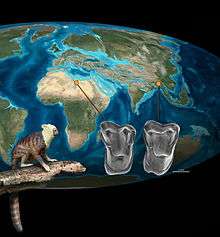Afrotarsius
Afrotarsius is a primate found in the Paleogene of Africa.

| Afrotarsius | |
|---|---|
| Scientific classification | |
| Kingdom: | Animalia |
| Phylum: | Chordata |
| Class: | Mammalia |
| Order: | Primates |
| Suborder: | Haplorhini |
| Infraorder: | Tarsiiformes |
| Family: | †Afrotarsiidae |
| Genus: | †Afrotarsius Simons & Bown, 1985 |
| Type species | |
| Afrotarsius chatrathi Simons & Bown, 1985 | |
| Species | |
| |
The first species to be named, Afrotarsius chatrathi, was named in 1985 on the basis of a single lower jaw from the Oligocene of Fayum, Egypt, and tentatively referred to the tarsier family (Tarsiidae).[1] However, this relationship immediately proved controversial, and in 1987 the animal was placed in a separate family Afrotarsiidae related to simians.[2] A tarsier-like tibiofibula was allocated to Afrotarsius in 1998,[3] but the identity of this bone is controversial.[4] In 2010, a second species of the genus, Afrotarsius libycus, was named from the Eocene of Dur At-Talah, Libya, on the basis of isolated upper and lower teeth. Features of these teeth were interpreted as additional evidence for a relationship between Afrotarsius and anthropoids.[5] A second afrotarsiid genus, Afrasia, was named in 2012 from the Eocene Pondaung Formation of Myanmar. In the same paper, Afrotarsiidae was placed together with the Asian Eosimiidae in an infraorder Eosimiiformes, closely related to crown-group simians.[6] However, some studies indicate that it should be placed in Tarsiiformes.
Evolutionary history
| Phylogeny of Paleogene simians[7] | |||||||||||||||||||||||||||||||||||||||||||||||||||||||||||||||||||||||||||
| |||||||||||||||||||||||||||||||||||||||||||||||||||||||||||||||||||||||||||
| According to Chaimanee et al. 2012, the close relationship between Afrasia djijidae from Southeast Asia and Afrotarsius libycus from North Africa demonstrates one of at least two dispersals of stem simians from Asia to Africa during the middle Eocene. |
References
- Simons & Bown 1985.
- Ginsburg & Mein 1987, p. 1215.
- Rasmussen, Conroy & Simons 1998.
- Godinot 2010, p. 321.
- Jaeger et al. 2010.
- Chaimanee et al. 2012.
- Chaimanee et al. 2012, p. 4 of 5.
Literature cited
- Chaimanee, Y.; Chavasseau, O.; Beard, K. C.; Kyaw, A. A.; Soe, A. N.; Sein, C.; Lazzari, V.; Marivaux, L.; Marandat, B.; Swe, M.; Rugbumrung, M.; Lwin, T.; Valentin, X.; Zin-Maung-Maung-Thein; Jaeger, J. -J. (2012). "Late Middle Eocene primate from Myanmar and the initial anthropoid colonization of Africa" (PDF). Proceedings of the National Academy of Sciences. 109 (26): 10293. doi:10.1073/pnas.1200644109. PMC 3387043. PMID 22665790.CS1 maint: ref=harv (link)
- Ginsburg, L.; Mein, P. (1987). "Tarsius thailandica nov. sp., premier Tarsiidae (Primates, Mammalia) fossile d'Asie". Comptes Rendus de l'Académie des Sciences. 304 (19): 1213–1215.CS1 maint: ref=harv (link)
- Godinot, M. (2010). "Chapter 19: Paleogene Prosimians". In Werdelin, L.; Sanders, W.J (eds.). Cenozoic Mammals of Africa. University of California Press. ISBN 978-0-520-25721-4.CS1 maint: ref=harv (link)
- Jaeger, J. J.; Beard, K. C.; Chaimanee, Y.; Salem, M.; Benammi, M.; Hlal, O.; Coster, P.; Bilal, A. A.; Duringer, P.; Schuster, M.; Valentin, X.; Marandat, B.; Marivaux, L.; Métais, E.; Hammuda, O.; Brunet, M. (2010). "Late middle Eocene epoch of Libya yields earliest known radiation of African anthropoids" (PDF). Nature. 467 (7319): 1095–1098. doi:10.1038/nature09425. PMID 20981098. Archived from the original (PDF) on 2013-03-08.CS1 maint: ref=harv (link)
- Rasmussen, D.T.; Conroy, G.C.; Simons, E.L. (1998). "Tarsier-like locomotor specializations in the Oligocene primate Afrotarsius". Proceedings of the National Academy of Sciences. 95: 14848–14850. doi:10.1073/pnas.95.25.14848. PMC 24538. PMID 9843978.CS1 maint: ref=harv (link)
- Simons, E. L.; Bown, T. M. (1985). "Afrotarsius chatrathi, first tarsiiform primate (? Tarsiidae) from Africa". Nature. 313 (6002): 475–477. doi:10.1038/313475a0.CS1 maint: ref=harv (link)